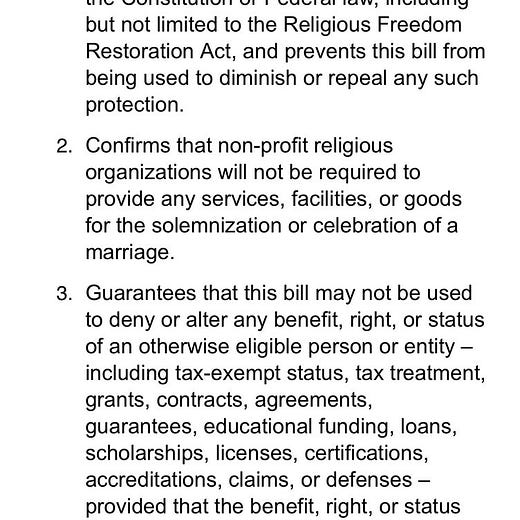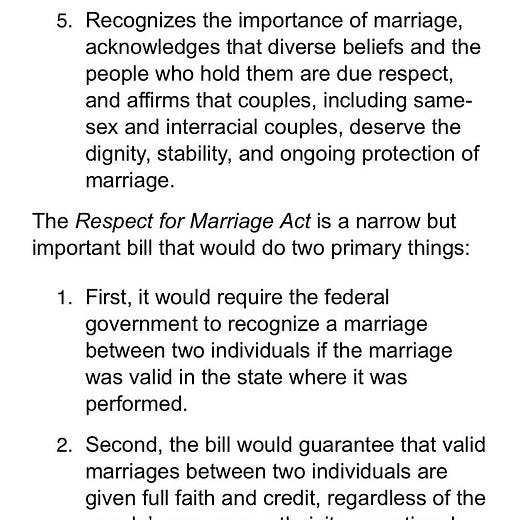The Respect for Marriage Act is a great thing
There's a lot of misinformation out there, and unwarranted worry among many on the left. Let's clear things up.
If you’ve valued reading The Signorile Report, consider becoming a paid subscriber and supporting independent, ad-free opinion journalism. Thanks!
This week the Senate is set to vote on — and according to reports, will pass, with over 60 votes — the Respect for Marriage Act. A procedural vote comes today, and final passage could happen by Friday.
The bill had passed the House in July with a surprising 47 Republicans joining all Democrats. It would have the federal government recognize same-sex marriage and interracial marriage by law. Senate Majority Leader Chuck Schumer was intent on taking a vote in the Senate before the midterm elections —putting Republicans on the spot.
But then RFMA was shelved until after the election, as openly lesbian Senator Tammy Baldwin of Wisconsin, the lead negotiator, advised that the votes weren’t there to pass it at the time, but would be there after the election, when Republicans have less pressure.
First off, let me say I was very wrong in my skepticism that RFMA would come back at all. And I was thus wrong in my criticisms of Democrats for not voting on it before the midterms.
So, a big mea culpa from me. I’m glad I was wrong.
Now, however, I’m seeing a lot of concern about an amendment added to the Senate version of the bill. Some LGBTQ people and other progressives are saying it waters the bill down, or, even worse, would endanger marriage equality right now in the states.
None of this is true. It actually enhances the bill. And the great Mark Joseph Stern at Slate, a long-time gay legal analyst, who comes on my SiriusXM show every week, explains in a piece headlined "Progressive Critics Are Wrong About the Senate’s Landmark Marriage Equality Bill,” why the concerns are unwarranted:
On the brink of this victory, however, there’s still a great deal of confusion over what, exactly, the bill does—and some debate among progressives about whether it’s even worth supporting. The short answer is that this measure, the Respect for Marriage Act (RFMA), is worthy of not just support but celebration: It repeals a bigoted [Defense of Marriage Act] while creating a crucial backstop for marriage equality in the states if the Supreme Court overturns Obergefell v. Hodges. As recently as 2015, it would’ve been unthinkable that such a sweeping bill could pass into law.
The unwarranted fears range from worries about “religious liberty” language in the Senate amendment, to a clause in that amendment that states it would “not require a State to issue a marriage license contrary to state law.”
People took that last line to mean states could change their laws right now, with Obergefell still not overturned, to ban same-sex marriage. But that’s false, and a misreading of the bill and the amendment.
The confusion actually began the moment RFMA was proposed by Democrats in the House this past summer, after Clarence Thomas’s concurring opinion in the Dobbs decision overturning Roe v. Wade, in which he suggested revisiting the Obergefell marriage equality decision and even Lawrence v. Texas, which threw out sodomy laws in the states.
Some advocates and much of the media, perhaps using shorthand or having a misunderstanding, described RFMA as “codifying” same-sex marriage and interracial into law, much as there was discussion — and a bill — to “codify” Roe v. Wade into law. This isn’t the proper language for either issue, but especially for RFMA, as marriage is and always has been something licensed by individual states. Unfortunately, no law passed by Congress could protect marriage equality in all the states if the Supreme Court overturned Obergefell — at least not one that would be upheld by this or even a less conservative Supreme Court.
RFMA, when proposed, was meant to protect the federal benefits of marriage — from Social Security benefits to veterans benefits —and to repeal the Defense of Marriage Act, which is still on the books even though the Supreme Court ruled it unconstitutional. (DOMA defined marriage for federal purposes as the union of “one man and one woman,” and deemed that states have the right to refuse to recognize same-sex marriages performed in other states.)
As I stated, if the Supreme Court overturns Obergefell, no federal law can stop Texas from banning same-sex marriage. But the version of RFMA passed by the House would make sure that couples in states like New York and California, which would certainly not ban same-sex marriage, do not lose the federal protections of marriage. (As far as the states that would ban same-sex marriage if Obergefell were overturned, there sadly wouldn’t be anything to be done except pass an amendment to the Constitution, which of course is an exceedingly difficult process that would need to be passed by a vote of two-thirds of Congress and then two-thirds of the state legislatures.)
The amendment in the Senate version of the bill has a lot of language about “religious liberty” and “religious freedom,” and that always — rightly — gets us very concerned. But it’s all padding in this case, meant to assuage senators who need the cover and need something restated that is already understood under current law. The amendment states, for example, that non-profit religious organizations and churches will not be penalized if they don’t recognize same-sex marriages — which is already something they are protected against.
A Catholic church doesn’t have to marry a same-sex couple (or recognize their marriage for religious purposes), just as they don’t have to marry a Jewish couple or a Hindu couple, and just as a Jewish synagogue doesn’t have to marry an evangelical couple.
Marriage is a civil right that the state oversees and licenses. Religious institutions (and others) are given the privilege to perform the ceremony and seal the deal, after the state issues a license.
So the bill just pads what is current law, as reassurance. And it was enough to get the Mormon Church to actually come out in support of it, which is pretty extraordinary considering that the LDS church was a driving force in trying to ban same-sex marriage and helped get the infamous Proposition 8 passed in California back in 2008.
Is the religious reassurance in the amendment a bit icky? To me, yeah. Do I mind it? No, not if it makes them feel better and gets it passed.
Regarding the other part of the amendment that has concerned some, let’s look at it in full:
Second, the bill would guarantee that valid marriages between two individuals are given full faith and credit, regardless of the couple’s sex, race, ethnicity, or national origin, but the bill would not require a State to issue a marriage license contrary to state law.
The very last line sounds like states could pass a law right now banning same-sex marriage. But as Stern explained to me and wrote about it, it applies only if Obergefell, currently the law of the land, is overturned — and the amendment actually enhances the rights of same-sex couples if that terrible reality comes to pass, using the full faith and credit clause of the Constitution.
Again, if Obergefell were overturned, nothing could stop Texas from banning same-sex marriage — or rather from enforcing the laws it still has on the books. But RFMA “would guarantee” that under the full faith and credit clause — which stipulates states must recognize judicial and other proceedings of other states — that Texas recognizes the marriages of same-sex couples who get married in other states. So this is an added benefit, in addition to repealing DOMA.
And let’s not forget that a Texas couple could not only go to New York for their wedding and have it recognized back in Texas; they could likely have their marriage performed online or on zoom by an authority in the state of New York, under New York state law. All of this, of course, is in the event that Obergefell is overturned, which we hope never happens.
So, there’s nothing nefarious in the bill, and it actually protects couples even further in case the unthinkable happens. People shouldn’t be concerned, and should see it as a great victory when the Senate passes the bill and President Biden signs it.
.






The Catholic Church can feed their followers any bull shit they want but the rest of us do not and should not be forced to adhere to their deranged religious beliefs. That also goes for all the other Shrea law, evangelicals in this country. As Marlo Thomas in her book said "Free to be You and Me". I am thrilled with the repudiation of trump and most of his acolytes in this election. Trump is doomed and he is a sinking ship. Let him run and the Democrats can bask in President Bidens 2024 victory. Let Trump form a third party and divide the Republicom party again assuring a Democratic win in 2024. I am depressed that so many voted republicons especially women who voted republicon in light of the Dobbs decision. I guess they are all hankering to become Handmaidens. Meanwhile I must go back to my postcard writing to ensure that Warnock wins his Senate run off. My little group here in NJ sent 25,000 postcards to Georgians in 2000 and we took control of the Senate. It is possible and it's not over.
The GOP is hell bent on taking rights away from people. We have to keep the pressure up on the Dems to do the right thing. Marriage was only started in the first place to convey property rights. Churches are the ones who made it something holy.